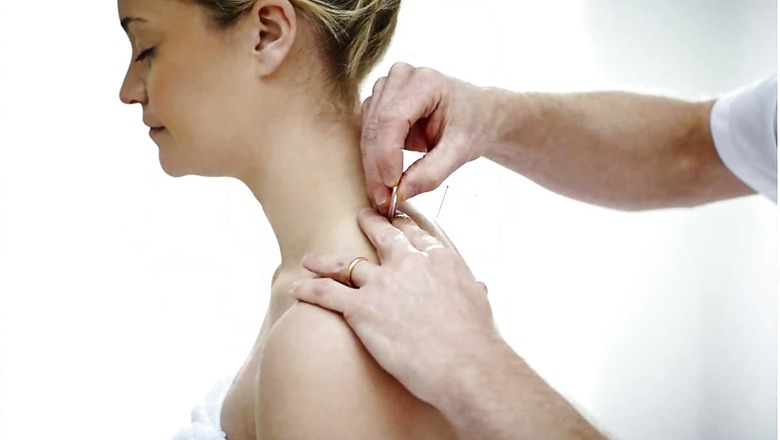
views
Apart from traditional allopathic medicines, there are various alternative medicine therapies such as homoeopathy, chiropractic and acupuncture, which claim to treat all sorts of diseases and are believed to have originated thousands of years ago.
Acupuncture is a traditional Chinese medicine therapy, which claims to relieve pain and tension in the body. In this therapy, an expert inserts thin, solid, metallic needles into specific points of the body. These needles are either moved gently by the expert or are connected with an electrical stimulator, which passes a mild current through them.
In a recent study presented at the Anesthesiology annual meeting, held online from 2nd to 5th October 2020, it was stated that acupuncture can help in lowering pain, anxiety and use of opioids after surgery.
Acupuncture before surgery reduces pain experienced afterwards
In the study, scientists included 106 veterans who were about to undergo surgery and some of them were given either traditional or battlefield acupuncture therapy. Battlefield acupuncture is a technique in which the expert penetrates the needles specifically inside the ear to reduce pain in the body.
The scientists divided the 106 veterans into two groups; the first group had 42 participants who had to undergo hip replacement surgery. They were either given traditional acupuncture treatment or kept in the control group (who did not get any therapy). The other group had 64 participants who were to undergo different surgeries, they were given battlefield acupuncture therapy or kept in the control group.
The results of the study showed that the control group required around three times the amount of morphine for pain management as compared to the acupuncture group. It was found that the control patients required 56 MME (morphine milligram equivalent) after the surgery while the patients who received acupuncture required only 20.4 MME of morphine.
Also, the patients who got acupuncture therapy reported less anxiety.
Here are some other benefits of acupuncture:
1. Acupuncture helps in releasing stress
We all have some stress in our lives. Acupuncture is believed to release stress by lowering the level of stress hormone (cortisol) in the body. This reduces stress and anxiety and instils a feeling of relaxation.
2. Acupuncture helps in improving the sleep
Acupuncture helps in improving the body’s natural ability to regulate the sleep cycle by increasing the production of melatonin. Melatonin is a hormone released by the pineal gland present in the brain and it helps maintain the sleep-wake cycle of the body.
3. Acupuncture benefits the digestive system
Studies have shown that acupuncture helps in maintaining the healthy functioning of the digestive system by rebalancing the faulty energetic fields. Research also suggests that acupuncture can help in dealing with both acute gastrointestinal problems and severe long-term digestive issues such as Crohn?s Disease, Inflammatory bowel disease and haemorrhoids.
4. Acupuncture is good for headaches
Studies have shown that acupuncture has the ability to reduce the frequency of migraine attacks and can relieve persistent headaches. Acupuncture is a less invasive and drug-free treatment option for chronic headaches.
5. Acupuncture can reduce allergies
Acupuncture is believed to boost the immunity of the body, thus it helps in combating common seasonal allergies. Acupuncture may also be able to treat the symptoms of allergies, such as swollen eyes, runny nose or itchy throat.
6. Acupuncture can help relieve back and neck pain
Acupuncture is the drug-free treatment for relieving pain, swelling and inflammation in the neck and back region. Acupuncture is believed to reduce pain associated with arthritis and sciatica (pain in the tail bone of the spine) as well. It can even help relieve muscle cramps.
For more information, read our article on What therapy is.
Health articles on News18 are written by myUpchar.com, India’s first and biggest resource for verified medical information. At myUpchar, researchers and journalists work with doctors to bring you information on all things health.
















Comments
0 comment